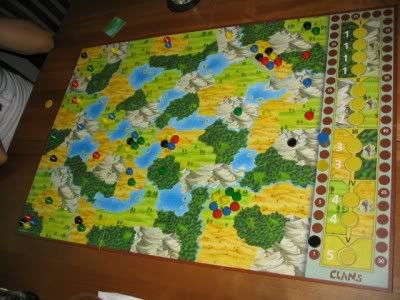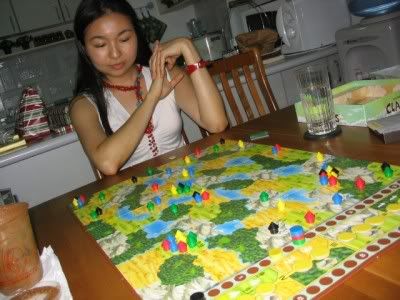You’ve got five tribes struggling to survive in an area. In order to survive, they group together. However, civilization in this period abhors weakness (I suppose it weakens the genes and makes it harder for offspring to survive), so a village will visit genocide on any clan that’s too weak. Villages are founded on fertile land, favorable to bountiful crops and good weather. Should a village be unfortunate enough to read the signs incorrectly and be founded on barren land, then the village perishes to a man.
I really don’t see how Clans has a weak theme, much less how it can be called an abstract.
Winning moves has put together a sweet package for Clans. The board of this game is amazing. It folds into the standard square Winning Moves box, but its six-part fold presents players with a board that’s six times its footprint. This is one of the most awesome boards I’ve ever seen in a German game. It’s linen-finished, and it’s got a clean, clear design. You also get a bunch of little wooden huts in the five tribal colors, plus a bunch of round yellow markers, five large thick tiles depicting huts of the Five Tribes, and five wooden scoring discs. Clans is one of my favorite “small game” packages, and it’s one of my favorite gateway games introduce non-gamers to German games.

The Game
Players represent the patron gods looking over the welfare of one of the Five Tribes. As such, they influence the formation of villages by moving all the huts in one region of the map into any adjacent region that isn’t empty. Once any inhabited region is surrounded by empty regions, a village is formed. The god whose move created the village gets a village token, and the village is evaluated. If the village contains a hut from each of the Five Tribes, a purge of weak genes is conducted. And tribe that has only one hut in the village has that hut destroyed (all that Tribe’s members in that village are slaughtered to maintain the strength of the genes in the village). Once this is done, the village is scored. Each tribe with a presence in the village after any purge scores points equal to the number of huts in the village.
That’s the main mechanism of the game. It’s very simple. There are a couple twists however.
Each region on the map represents a terrain type. Terrain may be fertile, neutral, or barren. Founding a village on neutral terrain results in what is described above. A village founded on favorable terrain scores a bonus for the tribes that are present in that village. The bonus increases as more villages are formed. A village that is unlucky enough to be formed on barren terrain (not really unlucky – some cruel god caused it to happen by design) is destroyed. The god that causes the village to be founded still gets his reward, but all the tribes perish to a man – no scores accrue. Which terrains are fertile, barren and neutral changes as the game progresses.
The other twist in the game is that the gods have no idea which tribe their rivals are shepherding. Which of the Five Tribes each player represents is determined randomly and secretly using the tribe tiles. Once the last village is formed, players reveal their tribe affiliating, and then add the number of village tokens they earned to the score of their tribe. The player whose tribe has the highest score wins.
Strategy
Clans is the game of Five Tribes, but is described as being for two to four players. This supports the secret tribe affiliation of the players, as one tribe will not have anyone actively supporting it. Part of the game is accumulating village tokens, but trying to mislead your opponents as to which tribe you’re behind. This is important as your village tokens are added to your final score; in a close game (and most are fairly close between at least three tribes) the village tokens provide the final margin of victory. Note that the less players in the game, the more possible confusion one can cause, but the more uncertainty one also has about who’s backing which tribe!

Each tribe starts with the same number of huts on the map. Thus, the objective of each player is to eliminate as many of the opposing huts as possible by subjecting them to tribal genocide, or dooming them by forming a village on barren terrain. Alternatively, a player should try to keep his own huts in play to be part of a successful village. One hut is sufficient as long as not all five tribes are going to be in the village. In fact, the more the huts of three other tribes in that village, the better as it reduces their opportunities to participate in other villages. When forming a village on barren land, it might be acceptable to sacrifice one of your own huts if it takes out more of the opposition’s huts.
The most challenging part of the game is tribal misdirection, if you can manage it. The only “leader” that’s obvious in the game is the tribe with the highest score on the scoring track. Since each player has village tokens, persuading your opponents that you’re backing the wrong village might persuade them to attack that tribe while inadvertently aiding you real tribe. Expect some finger pointing as to who’s really backing which tribe, which is part of the good fun of Clans.
Reviewer’s Tilt
Clans is a deterministic, luckless game, which is unusual in a light, fast and simple game. Thus, it is a perfect title to introduce the uninitiated to German games, as it eliminates the usual crutch of the “classics”, dice and cards, and emphasizes decisions. It also shows off two of the strengths of German games – excellent graphic design, and robust gameplay without sacrificing a good theme. Clans can be taught in five minutes, and a game can be played in 15 to 20 minutes once the players are comfortable with the terrain and genocide mechanisms. It’s an excellent little game for up to four players. I suppose you can play with five and eliminate the “dummy”, but I feel that it would become a bit too chaotic. Still, it’s an option.
Of Colvini’s two best known games, the other being Cartagena, I prefer Clans. Clans plays faster, and does not involve the luck of cards (even considering the Tortuga version of Cartagena). It lacks the pirate trappings of Cartagena, but given that Clans involves tribal slaughter and there isn’t a hint of violence in Cartagena, the theme of Clans wins hands down. Finally, Clans is just a lot faster. Players make their move, score if a village is formed, and the turn passes. In Cartagena, players tend to take time planning their moves since the previous player’s turn may have changed the board situation substantially, and they can play up to three cards per turn. Cartagena’s decision tree doesn’t decline substantially. In Clans, the decision tree grows smaller as villages are founded, speeding the game towards its conclusion. It’s a definite plus when introducing non-gamers to the wonders of German games.
Once players have learned Clans and are ready to move on to weightier, meatier games, Clans still serves as a good palate cleanser between bouts of Puerto Rico and Euphrat & Tigris, or as an icebreaker or closer of a night of gaming. Of course, it still belongs on the shelf as a top-notch quick gateway game, ready usher in the next batch of new German games enthusiasts.
No comments:
Post a Comment